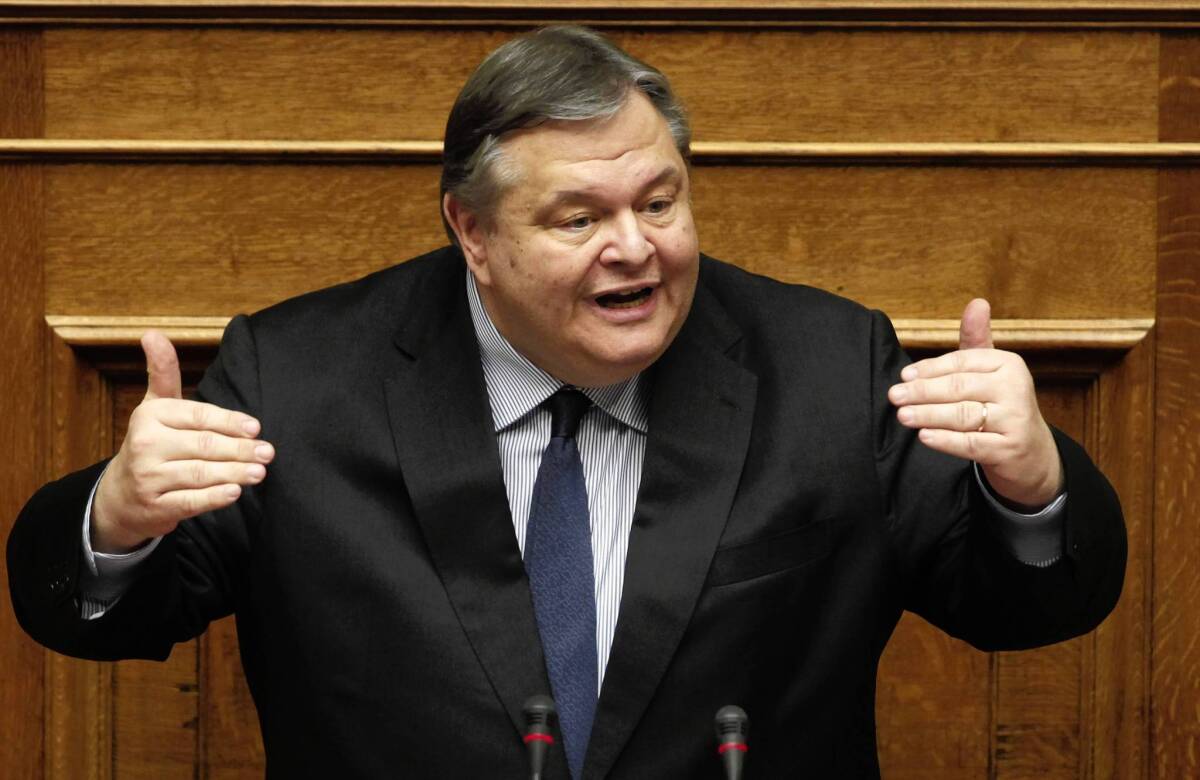Former Greek finance minister to face investigation over tax list

- Share via
ATHENS — Greek lawmakers voted Friday to launch a congressional investigation of allegations that former Finance Minister George Papaconstantinou tinkered with a list of suspected tax cheats, erasing the names of three of his relatives in the biggest tax-evasion scandal in decades.
The 265-6 vote, with three abstentions and some invalid ballots, capped an explosive 14-hour parliamentary debate that kicked off Thursday and put the former political strongman and architect of the country’s first austerity program at the center of a murky tale of coverups, intrigue and corruption. Near-daily disclosures have undermined the government’s bid to revive public confidence and to crack down on widespread tax evasion.
Three other politicians, including two former prime ministers, were spared the ignominy of weeks of grilling by congressional panels after the majority of Greece’s 300-member legislature voted against their prosecution in four rounds of secret balloting at the end of a marathon debate.
The vote stems from accusations of fraud and breach of duty leveled against Papaconstantinou in December after a judicial inquiry found that he might have deleted the names of three relatives from a list of wealthy Greeks with more than $2 billion in savings stashed away at the Geneva branch of HSBC Holdings. The former finance minister is reviled by many of his compatriots for signing up Greece for its first international bailout and years of austerity.
Papaconstantinou has acknowledged receiving a digital version of the list from Christine Lagarde, the head of the International Monetary Fund, when she was French finance minister and he was serving in the socialist government of Prime Minister George Papandreou in 2010.
He has repeatedly denied any wrongdoing. But on Thursday, the suave socialist-minded economist took responsibility for mishandling the data before a gaggle of reporters, camera crews and a half-empty chamber of lawmakers.
“I gave the original compact disc to my secretary after passing on a copy to the country’s financial police,” he said. “I am unaware of where it is now. The political responsibility is clearly my own … but it is unfortunate that my mishandling of this issue can be used as an excuse for this process.”
His successor as finance minister, Evangelos Venizelos, turned up a copy a year later when another version was leaked to the news media. By then, Venizelos was no longer finance minister, and the current finance minister ordered a new investigation.
“This is the ultimate, most telling tale of Greece’s long-standing problem,” said Pavlos Tsimas, a leading commentator. “It has nothing to do with numbers, but rather the quality, the ethics and the failure of the political system.... When politicians effectively take over civil administration, the risks are enormous.”
Nearly three years after the French tipoff, none of the more than 2,000 Greeks on the so-called Lagarde list has been investigated, let alone charged.
Before Friday’s parliamentary vote, Venizelos, Papandreou and his successor, Lucas Papademos, also faced coverup allegations in the tax-evasion scandal. It appeared certain that lawmakers would vote for a further investigation of the allegations against Papaconstantinou, but it remained unclear whether they would do so for Venizelos, a pugnacious constitutional lawyer who took over the helm of Greece’s socialist party in 2012. The party is part of the current conservative-led coalition government.
With Greeks reeling from a third year of increased austerity, the scandal has stoked public scorn, heightened distrust of the political elite and fueled resentment of the rich.
What’s more, Tsimas said, “it has robbed Greeks of the last thing they have: hope.”
Carassava is a special correspondent.
More to Read
Sign up for Essential California
The most important California stories and recommendations in your inbox every morning.
You may occasionally receive promotional content from the Los Angeles Times.













